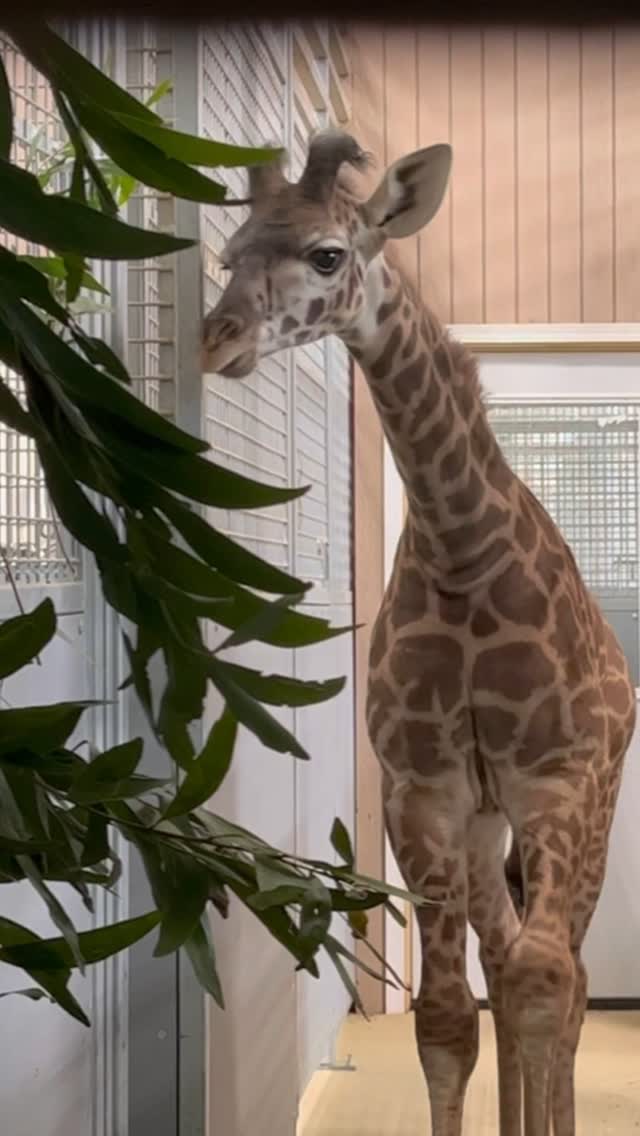- The significance of early training for zoo animals and how it benefits their long-term health and well-being.
- The educational process of teaching animal behaviors and why weighing Hadassah is a vital skill.
- The role of zoo management in ensuring a balanced and safe environment for both animals and staff.
- Insights into the veterinary care of giraffes and how regular health checks support conservation efforts.
- Conservation messages and the broader implications of zoo programs on wildlife preservation.
In the bustling environment of a modern zoo, the early training and care of young animals like Hadassah, a giraffe calf, play a crucial role in their development and overall well-being. This process is particularly vital for their health check-ups and subsequently, their long-term survival. As part of this educational journey, animal expertise from trainers and veterinarians converge. Understanding why Hadassah’s recent training to step onto a scale is significant allows us to glimpse the intricacies of animal care and management.
The training of zoo animals is an essential component of modern zoological practices. This approach is not just about teaching animals tricks or tasks for exhibit purposes but critically centers around their health and well-being. Hadassah, for instance, is in the initial stages of learning to step onto a scale—a basic yet fundamental skill. This behavioral training is more than just a routine; it forms the bedrock of effective animal management. By getting accustomed to being weighed, Hadassah is helping her caretakers monitor her growth and detect any health abnormalities early on. This enables timely interventions, should any discrepancies arise.
From a young age, like all creatures, giraffes need consistent monitoring to ensure healthy development. Accurate weight records are a vital part of maintaining their health. Weighing provides data that helps assess how well the animal is growing or adjusting to its diet. In the wild, a giraffe’s weight and stature significantly influence its ability to avoid predators and thrive. Following that natural principle, in a controlled zoo environment, these parameters must be carefully observed to support their long, healthy lives. The training Hadassah undergoes is not just a matter of weekly routine; it is a crucial aspect that underlies the animal’s future well-being.
Early training in a giraffe’s life, such as stepping onto a scale, involves positive reinforcement, providing the calf with rewards upon successfully following commands. Keepers must employ a patient, gentle touch with young animals like Hadassah, encouraging them to engage without fear or anxiety. This approach promotes a safe learning environment, where trust between the animal and its caretakers can flourish—a vital aspect considering the long lifespan and towering size of a giraffe.
Zoo management plays a critical role in orchestrating this training seamlessly. Each member of the staff contributes to a safe environment, ensuring both animal and human participants are protected. Training routines require strategic planning and cooperation among keepers, as every action they take impacts the overall health and safety conditions of the zoo. Zoos often rely on a collaborative approach, combining the expertise of trainers, veterinarians, nutritionists, and researchers to develop balanced regimes conducive to the animals’ enrichment.
Regular veterinary care is central to maintaining animal health, particularly in a zoo setting where disease risks can vary significantly from their natural environments. With giraffes like Hadassah, preventative care is paramount; their health checks must be rigorous and consistent. The ability to monitor weight changes accurately is a powerful tool in a zookeeper’s kit. Monitoring allows the early detection of potential health issues, which can range from dietary imbalances to more serious conditions requiring veterinary intervention.
The zoo’s role extends beyond just caring for the animals within the facility, as it often intersects with broader wildlife preservation efforts. Enabling animals like Hadassah to thrive sets a precedent for conservation initiatives, showing how structured environments can aid in preserving species that might be at risk in their native habitats. By promoting animal welfare practices and supporting species conservation work, zoos reinforce their commitment to wildlife protection.
Hadassah’s early training at the zoo is not an isolated event. It is a reflection of the intensified focus on developing comprehensive wildlife care and conservation programs—a reflection that echoes the zoo’s broader mission of education, preservation, and care. Engaging with Hadassah’s learning journey allows the public to connect with the majestic giraffes and appreciate the complexity of their needs, encouraging a deeper interest and support for ongoing conservation efforts.
In conclusion, every step a young giraffe like Hadassah takes towards participating in her care enhances the possibility for a robust and healthy future. Her training signifies the important role of early education, coherent zoo management, and effective veterinary practices in the conservation of these magnificent creatures. As we observe Hadassah learning to step onto a scale, we gain insight into not only her life but also the wider implications of zoological and conservation practices that strive to protect animal species worldwide. Observing these practices helps in bolstering our understanding and enriching our respect for the formidable effort required to sustain the delicate balance of life within modern zoos.
*****
Source Description
Hadassah update! Our giraffe calf is busy behind the scenes learning and being adorable. Right now, the keepers are teaching her how to walk onto a scale. Weighing animals is an important part of caring for them! This kind of training also helps the keepers examine the giraffes and provide veterinary care for them, so it’s great that Hadassah is learning it so early!


